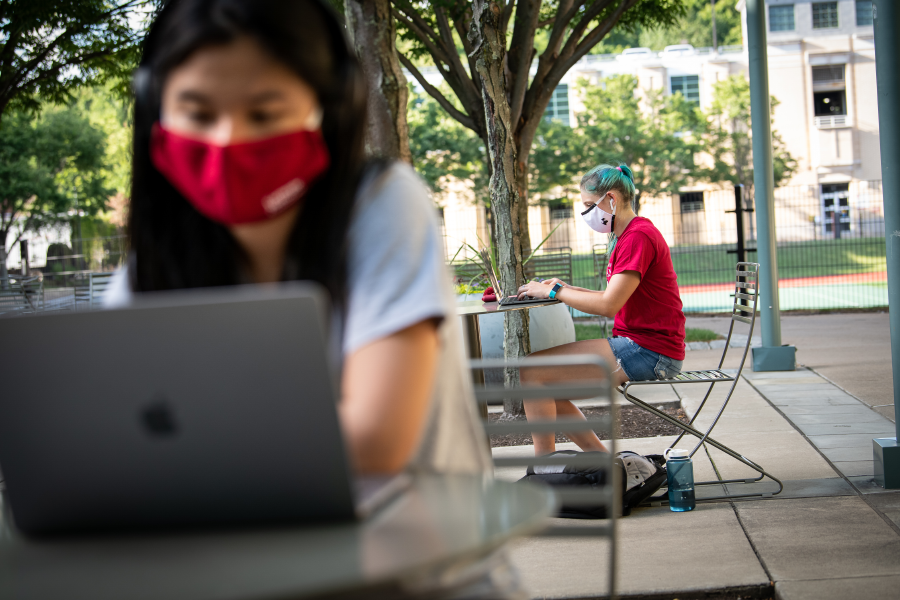
A Year in Review: Modern Languages Helps Students, Educators to Navigate the Pandemic
By Meghan Marino
As a department focused on global sociological relationships and sociolinguistics, Modern Languages launched a variety of courses and professional projects in response to the COVID-19 pandemic. Our faculty responded with unique approaches that have aided both students and educators in navigating the changes that have taken place in language learning and cultural studies this past academic year.
Here are some of the courses that our Modern Languages educators have offered:
82288: Everyday Learning: Designing Learning Experiences in Times of Unrest and Uncertainty
What digital objects could students create to reflect the desire for learning that many people have turned to during life in the pandemic? This course, taught by Stephan Caspar, discussed how learning takes place on social platforms and how learning is utilized for hobbies, personal interests, or as a political statement and form of activism, particularly during the summer of 2020 following the Black Lives Matter protests. This course will be offered again in the Fall semester of 2021.
82245 - COVID Cultures
How has COVID impacted the Spanish-speaking world? How have certain groups of individuals been disproportionately affected by the pandemic? This course, taught by Candace Skibba, allowed students to explore their own concept of narratives of the body and the pandemic. The course hosted guests such as CMU alumna, Andrea Shockling, as well as local creator and social justice advocate, Alyssa Cypher.
82426 - Wellness in the German-Speaking World
How can students in Modern Languages combine wellness with cultural studies? This course, taught by Gabriele Maier, allowed students to explore wellness concepts in Germany from a multitude of angles. Starting from the origins and definitions of “wellness” and “well-being” within the American and German context, students investigate the current wellness industry, be it tourism, marketing or alternative methods such as yoga or osteopathy, and explore how the specific genre of comics, called graphic medicine, can educate the public about personal ailments and possible cures. As their final project, students were asked to put their own “wellness” stories into visual narratives with the help of comic artist John Peña, a 2008 graduate of the College of Fine Arts.
99520 - Language in the Time of COVID-19:
How have facial masks impacted speech comprehension? How do linguistic choices in social media posts affect political biases? How has Black Lives Matter affected speaker judgments when talking about COVID-19? This course, taught by Seth Wiener, examined how the pandemic has affected different aspects of language. It also navigates psychological processes and linguistic behaviors as students collaborate to design experiments, collect data, build statistical models to test hypotheses, and see how the results compare to previous studies.
Our educators have also been dedicating their time to projects such as:
COVID Conversations:
As a part of the “How Well?” project, Gabriele Maier and Candace Skibba focused on narratives of wellness and illness as a part of their 2020-2021 fellowship with the Humanities Center. Maier and Skibba invited artists, scholars, and intellectuals to their series “COVID Conversations” which shared stories on how oral and visual practices have been used during this time.
The series has featured guests such as:
Comic artist, Laura Gao, who was born in Wuhan, China and raised in Dallas, Texas. As a queer Asian-American comic artist, Laura strives to inspire others through stories about her own life.
Photographer Raymond W. Holman Jr, who started a personal project titled, “COVID-19 in Black America.” The project is Holman’s way of trying to understand and document the unique affects the pandemic is having on Black and Brown people in the United States.
Spanish physician, bioethicist and comic artist Monica Lalanda, who combined her professional experience into a series of illustrations. Lalanda is the coordinator of the Spanish Graphic Medicine Movement.
Research on language learning and multicultural studies:
Stephan Caspar published “Exploring the pandemic through language learning and multicultural studies,” which highlights how language learning and multicultural studies have “highlighted the potential to help communities draw parallels with, and face wider issues concerning minorities within a challenged society.”
Pandemic Pedagogy:
Candace Skibba created a podcast titled “Pandemic Pedagogy”, which explores educator experiences during a global pandemic, and the strategies that educators have developed in response. The first episode was released on May 13, 2021.
“Teaching through the pandemic, A Brit’s view from the US”:
Stephan Caspar was featured on The Edtech Podcast in an article titled, “Teaching through the pandemic, A Brit’s view from the US,” where he discussed his experience with remote teaching, student support, and much more.
This is America: Teaching in light of COVID-19 and Black Lives Matter:
Stephan Caspar took part in a webinar with the London Branch Association for Language Learning titled, “This is America: Teaching in light of COVID-19 and Black Lives Matter”. Caspar discussed his experience as an educator and the needs that students have had during times of social injustice and a global pandemic.